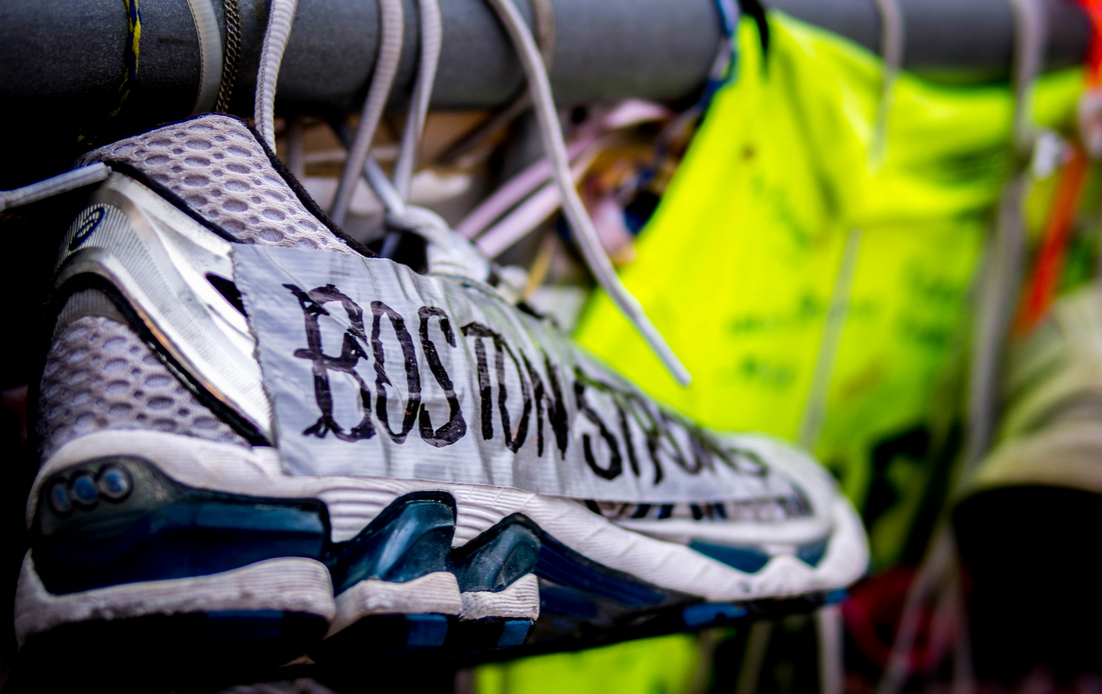Boston Strong: Commercializing Trauma
BY RACHEL BUTLER
When you type the words “Boston Strong” into Google, the first results that pop up are t-shirts for sale. With an $11.98 kids’ version, a $19.99 variation sporting the Boston Bruins logo, and a $25 iteration with the Boston skyline on the front, the Boston Strong t-shirt has become ubiquitous in Boston and beyond.
The phrase “Boston Strong” emerged in the immediate aftermath of the Boston Marathon bombings almost two years ago, on April 15, 2013. The slogan had its roots on Twitter, and its popularity quickly grew; even the city’s sports teams were quick to pick up on the slogan. The Bruins displayed the phrase on their helmets at the game on April 17, two days after the bombings, and the words were emblazoned on the Green Monster wall at the Red Sox’s Fenway Park. That same day, two vendors submitted separate trademark registration applications to the U.S. Patent and Trademark Office, seeking to obtain ownership of the “Boston Strong” slogan for use on commercial products. The trademarks weren’t approved, but nevertheless the slogan has become a huge commercial success, with vendors hawking variations of it all over the city of Boston.
Many phrases that enter the public consciousness are quickly commercialized – products emblazoned with the terms “YOLO,” “swag,” “selfie,” and the omnipresent hashtag have generated millions, if not billions, of dollars in revenue. However, the “Boston Strong” slogan is much more emotionally charged than most of these terms, considering the terrorism and trauma that gave rise to it. Capitalizing on the bombings seems crass considering their recentness and the ongoing suffering of many victims and their families. Yet the fact that there is enough demand to make selling the merchandise lucrative is more concerning, as the buyers’ possible motives are questionable. Has “Boston Strong” become a trendy, trivial catchphrase not unlike the chorus of YOLOS and swags which also rose to fame on Twitter? That seems to be one motive of Boston Strong consumers; in the wake of the bombings, wearing a t-shirt with the slogan was simply the trendy thing to do.
Another apparent motive for Boston Strong buyers is the slogan’s connection to Boston’s sports teams. The most common manifestation of the shirt incorporates the Red Sox “B” logo above the word “strong,” as if the Red Sox organization were sponsoring the city’s attempt to recover from terrorism. This is true, in a sense – the Red Sox organization has donated hundreds of thousands of dollars to the One Fund, which distributes money to the victims of the bombings and their families. However, the MLB also makes a profit off of its Boston Strong merchandise: for $349.99 (plus shipping and handling), you can buy a baseball inscribed with the Boston Strong slogan by David Ortiz himself, with no proceeds going to the One Fund. Other Boston associations have been quick to follow suit – you can now buy Boston Strong products featuring any and all Boston sports teams’ logos, most of which are sold totally for-profit (though not all are sold directly by the leagues). When a consumer buys products that link the phrase to a sports team’s logo, he or she supports the sports team rather than commemorating a tragedy – there might as well be a “Red Sox,” “Celtics” or “Bruins” inserted between “Boston” and Strong.”
What makes this equation of Boston Strong with Boston sports so commercially successful is in part the fact that the slogan’s connection to the city’s teams has gone beyond merchandising; it has become a rallying cry of the teams themselves. At their first game following the bombings, the Red Sox wore special jerseys emblazoned only with the word “Boston,” rather then the usual “Red Sox,” suggesting that the team represented the city itself when it played the Kansas City Royals that day (luckily, the Sox won). The team also hung a Boston Strong jersey on the dugout, and wore “B Strong” patches on their uniforms for the remainder of the season. Many members of the team and its fans credited the Sox’s subsequent World Series win to the inspiring, rallying effect of the marathon bombings. It added a depth of meaning to the win, for fans and players alike. To celebrate, fans congregated at the site of the marathon finish line where the bombings occurred; the Red Sox even arranged their victory parade so that it would pause at that spot.
Sports teams are, undoubtedly, deeply connected to their home cities. The Red Sox’s responses to the tragedy and their fans’ linking of their win to a sense of citywide recovery are natural in the context of the team’s deep-rooted attachment to Boston’s culture and history. However, capitalizing on that attachment for commercial gains is wrong, and selling a t-shirt that combines a team’s logo with the phrase Boston Strong cheapens the slogan by separating it almost completely from its traumatic beginnings.
